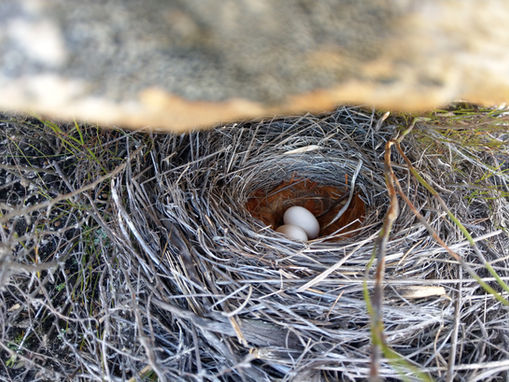
Research Overview
My research has covered a broad range of ecological concepts, but they all have one thing in common: how are anthropogenic-induced changes to our planet affecting birds.
For my current postdoctoral research I am examining how human-modified environments are affecting behaviour and reproduction in Arabian Babblers.
For my Masters and PhD I collected data looking at how climate change may be related to decreasing sightings of Cape Rockjumpers.
For my Honours I examined how noise may be affecting communication in adult Tree swallows provisioning their young.

Cape Rockjumpers
Evidence of the impact of climate change on our collective environment has been highlighted by many scientific studies in over the past two few decades. However, there are still many gaps in our understanding of the consequences of global warming and in particular of its effect on biodiversity. Although international communities (e.g. IUCN) often focus on range-restricted species in the polar regions, another often overlooked ecozone are is high alpine habitats, or “sky islands”. Sky islands have large proportions of endemics and their mountain-top locations leave inhabitants with no little opportunity to move to higher (and thus cooler) habitats as their current habitats continue to warm.
The Cape Rockjumper - a South African endemic bird species – is suffering population declines that are heavily correlated with habitat warming within its current range. Cape Rockjumpers are restricted in their distribution to the mountain slopes of the Western and Eastern Cape provinces: the “sky islands” of south-west South Africa. My goal was to try and find the mechanism for this decline, in the hopes we can find a way to bolster not only Rockjumper populations, but those of other similarly affected species.
To do this, I examined Rockjumper behaviour, reproduction, genetics, and physiology. In general, the biggest culprit seemed to be the interacting effects of climate and predation on breeding success. Nestlings struggled at high temperatures, with parents not able to provide sufficient food at higher temperatures. This made sense, as we found adults spend less time foraging at high temperatures, when they're spending time resting in shade. At these higher temperatures they also dealt with more predation from snakes.

Noise and Swallows
The world is getting louder, and wildlife are having to adjust. For my Honours I added white noise to Tree Swallow nests for 3 days and then filmed provisioning to see how parents and nestlings responded. With noise, nestlings begged more emphatically, and parents gave more contact calls to stimulate begging, but to no obvious detriment, as mass and fledging were not significantly different.

























